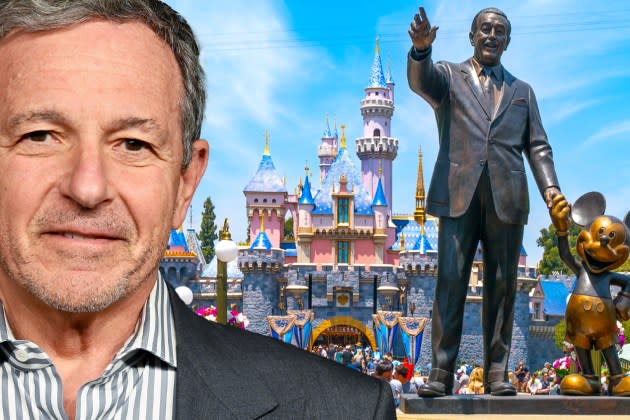Disney CEO Bob Iger Says He’s Trying Hard “Not To Get Distracted” By Activist Investors

Disney CEO Bob Iger called the proxy fight being waged by two activist investors a campaign that “is, in a way, designed to distract us, to take our eye off all [that’s] necessary to do what we need to do to generate returns for shareholders.”
Nelson Peltz’ Trian Partners is fielding two director candidates – himself and former Disney executive Jay Rasulo — and has been aggressively soliciting Disney stockholders, mostly recently in a 133-page document yesterday. Investment firm Blackwells Capital has nominated three candidates. Shareholders will elect the board at Disney’s annual meeting April 3.
More from Deadline
Charter CEO Chris Winfrey Sees $89 Million Compensation Package In 2023
Nelson Peltz Slams Disney, From 2019 Fox Deal To Planned Sports Streaming JV, As Proxy Battle Rages
Iger, speaking at a Morgan Stanley investor conference, said he’s “working very hard not to let this distract me. Because when I get distracted, everyone that works for me gets distracted, and that is not a good thing.”
He’s been back at Disney for 15 months now and said things were difficult but he’s pleased with where the company is – ahead on cost savings, heading to streaming profitability, in the midst of a studio turnaround, and investing heavily in parks and games.
“I came back and discovered right away that it was a company dealing with a lot of issues, not just the disruptive forces of technology in our businesses.” A big round of layoffs and other cuts will save the company more the $7.5 billion.
Streaming was still chasing subscribers instead of profits, Disney had been restructured (by Iger’s designated successor, former CEO bob Chapek) and “creativity wasn’t really put at the center, and needed to be.”
“But, more importantly, there wasn’t enough accountability. Particularly on the creative side. Creatives make the product, spend the money that it costs to produce the product, and they need to be held accountable for how it’s monetized. And they weren’t. And that was a big issue. Clearly, the studio had met with some hard times, or harder time .. that needed addressing. And obviously all that affected the balance sheet.”
Disney was the first traditional media company to launch a streaming service, Iger noted, and is the biggest after Netflix. He reiterated Disney’s forecast of streaming profits in the fourth quarter. Asked how the business could really take off, he said, “We got to 100 million pretty fast. What we didn’t have was the technology that we needed to basically lower customer acquisition, retention costs, to increase engagement, to essentially grow our margins by reducing marketing expenses.”
“We’re now in the process of developing all of that technology. And obviously, the gold standard there is Netflix. We need to be at their level in terms of technology capability. And one of the reasons why their margins are so much more significant than ours, is because they have that technology. So, our marketing expenses are significantly higher, our churn rates are higher than they need to be.”
Disney is talking with potential strategic partners for ESPN, still planning to take the linear network over the top next year, and make it available to subscribers of the planned streaming JV announced last month with Warner Bros. Discovery and Fox.
It “will be made available to both linear subscribers, and ultimately will be made available to people who are part of the joint venture, where if you want the ESPN app, and you’re already a subscriber to the JV, there’ll be a way to do that, whether it will be an upsell, we haven’t really determined that.”
Disney is investing $60 billion in parks in coming years, including several billion to double the size of Disneyland in Anaheim.
“This is a very complex company to run. There are many moving parts, there are different markets, are different industries that we’re in — cruise ships and streaming and movies and TV and theme parks, and you name it. There are different dynamics. Many of the businesses are are experiencing the effects of disruption [and] that takes not only a significant amount of knowledge, but a tremendous amount of time and focus. And I’m not talking about just me, I’m talking about me and the entire senior management team of the company. We’re at this hard every day. And when you go from fixing, which was significant and heavy lifting, to building, to really creating meaningful growth for our shareholders, the only way you will, is focus.”
And the activist investor campaign “is, in a way designed to distract us to take our eye off all those balls that we talked about, that are necessary. And time and focus is necessary to generate what we need to generate for the shareholders. It’s that simple. And I am working really hard to not let this distract me. Because when I get distracted, everybody who worked for me gets distracted. And that’s not a good thing. I’ll leave it at that.”
Best of Deadline
Hollywood & Media Deaths In 2024: Photo Gallery & Obituaries
2024 Premiere Dates For New & Returning Series On Broadcast, Cable & Streaming
TV Cancellations Photo Gallery: Series Ending In 2024 & Beyond
Sign up for Deadline's Newsletter. For the latest news, follow us on Facebook, Twitter, and Instagram.

